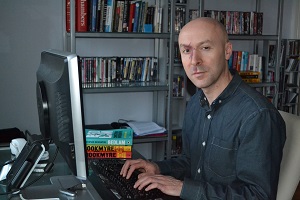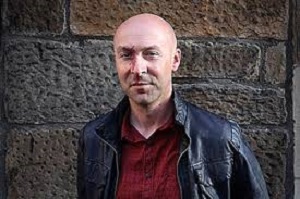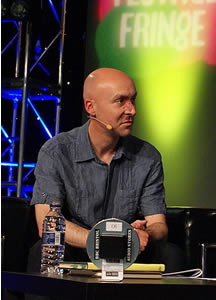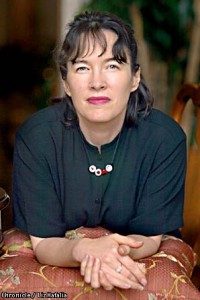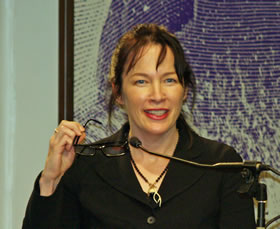De Amerikaanse schrijfster Alice Sebold op 6 september 1962 in Madison, Wisconsin. Zie ook mijn blog van 6 september 2009.
Uit: The Lovely Bones
„My name was Salmon, like the fish; first name, Susie. I was fourteen when I was murdered on December 6, 1973. In newspaper photos of missing girls from the seventies, most looked like me: white girls with mousy brown hair. This was before kids of all races and genders started appearing on milk cartons or in the daily mail. It was still back when people believed things like that didn’t happen.
In my junior high yearbook I had a quote from a Spanish poet my sister had turned me on to, Juan Ramón Jiménez. It went like this: “If they give you ruled paper, write the other way.” I chose it both because it expressed my contempt for my structured surroundings à la the classroom and because, not being some dopey quote from a rock group, I thought it marked me as literary. I was a member of the Chess Club and Chem Club and burned everything I tried to make in Mrs. Delminico’s home ec class. My favorite teacher was Mr. Botte, who taught biology and liked to animate the frogs and crawfish we had to dissect by making them dance in their waxed pans.
I wasn’t killed by Mr. Botte, by the way. Don’t think every person you’re going to meet in here is suspect. That’s the problem. You never know. Mr. Botte came to my memorial (as, may I add, did almost the entire junior high school -I was never so popular) and cried quite a bit. He had a sick kid. We all knew this, so when he laughed at his own jokes, which were rusty way before I had him, we laughed too, forcing it sometimes just to make him happy. His daughter died a year and a half after I did. She had leukemia, but I never saw her in my heaven.“

Alice Sebold (Madison, 6 september 1962)
De Schotse schrijver Christopher Brookmyre werd geboren op 6 september 1968 in Glasgow. Zie ook mijn blog van 6 september 2008. Zie ook mijn blog van 6 september 2009.
Uit: Country of the Blind
“If Nicole Carrow was being absolutely honest with herself, her most substantial reason for believing Thomas McInnes was innocent was that he had made her a nice cup of tea. She hadn’t been a lawyer long, but she still suspected she might need more than that in court. Her two weeks experiencing the practical application of Scots Law had demonstrated a few divergences from its more familiar English cousin, but she’d yet to find precedent for a special defence of Refreshing Herbal Infusion.
Nicole had anticipated an uncomfortable breaking-in period in Glasgow – acclimatising herself to the city, the people and the notorious weather – and was prepared for feeling like a fish out of water in the job for a while. However, her vision of in-at-the-deep-end had nonetheless proven short-sighted: she’d naively assumed it would be a bit more than a fortnight before she was representing the accused in a crime that had shaken the world.
Obviously the contents of the oh-so-mysterious envelope had raised her hopes and stiffened her resolve, but the sober reality was that – as Mr Campbell had pointed out – they merely thickened the plot her client was embroiled in, and apart from briefly delighting a few conspiracy theorists, would ultimately be of more use to the prosecution.
The coldfacts remained that McInnes, his son Paul, one Robert Hannah and one Cameron Scott had been apprehended fleeing the grounds of Craigurquhart House in Perthshire, that the Dutch media mogul Roland Voss, his wife Helene and their two bodyguards had been found murdered within, that when Paul McInnes was detained he was soaked in blood, and that an attempt had been made to open Voss’s bedroom safe.
McInnes and Hannah had been members of the “Robbin’ Hoods”, as the tabloids had tagged them, a gang responsible for a series of country-house break-ins over a short but prolific period during the mid-1980s, the name referring to their profession of pilfering from the rich, and conveniently ignoring their omission of the giving-to-the-poor part.“

Christopher Brookmyre (Glasgow, 6 september 1968)
De Duitse schrijfster Amelie Fried werd geboren op 6 september 1958 in Ulm. Zie ook mijn blog van 6 september 2009.
Uit: Offene Geheimnisse
„Gibt es etwas Deprimierenderes als den Frühling? Die Vögel singen, prominente Liebespaare lassen sich halbnackt fotografieren, die Badesaison droht, und es muss ein neuer Bikini her.
Es soll ja Männer geben, die Frauen lieben – die Gestalter von Anprobekabinen in den Bademodenabteilungen von Kaufhäusern gehören definitiv nicht zu ihnen.
Das müssen die schlimmsten Frauenhasser unter der Sonne sein, denn warum sonst leuchten sie gnadenlos diese Kabuffs aus, in denen wir unser winterweißes Fleisch aus den zu eng gewordenen Jeans schälen, um fröhlich-bunte Bikinis anzuprobieren, die uns eigentlich Langnese-gute-Laune machen sollten.
Gute Laune? Von wegen! Mit vor Entsetzen starrem Blick in den Spiegel beschließen wir, nicht zu
glauben, was wir sehen. Dieses Dellengebirge sollen unsere Oberschenkel sein, dieser Michelin-Reifen unsere Taille? Unmöglich. Das kann nicht sein. Das grelle Licht von oben suggeriert einen völlig falschen Eindruck. Dann fällt uns ein: Die Sonne am Strand kommt auch von oben.
Soll das etwa heißen, die anderen Badegäste sehen, was wir gerade sehen?
Aaaargh! Flucht aus der Kabine, Rettung ins nächste Café, ein Stück Torte mit Sahne und einen süßen Kakao für die aufgewühlten Nerven. Gibt es nicht so was wie ein Recht auf körperliche und seelische Unversehrtheit?
Das Recht auf menschliche Behandlung, auch in Bademoden-Umkleidekabinen? Was wir dort
erleiden müssen, grenzt an eine Verletzung der Menschenrechte.“

Amelie Fried (Ulm, 6 september 1958)
De Amerikaanse schrijfster Jennifer Egan werd geboren in Chicago op 6 september 1962. Zie ook mijn blog van 6 september 2007 en ook mijn blog van 6 september 2008. Zie ook mijn blog van 6 september 2009.
Uit: Emerald City
„Sisters of the Moon
Silas has a broken head. It happened sometime last night, outside The Limited on Geary and Powell. None of us saw. Silas says the fight was over a woman, and that he won it. “But you look like all bloody shit, my friend,” Irish says, laughing, rolling the words off his accent. Silas says we should’ve seen the other guy.
He adjusts the bandage on his head and looks up at the palm trees, which make a sound over Union Square like it’s raining. Silas has that strong kind of shape, like high school guys who you know could pick you up and carry you like a bag. But his face is old. He wears a worn-out army jacket, the pockets always fat with something. Once, he pulled out a silver thimble and pushed it into my hand, not saying one word. It can’t be real silver, but I’ve kept it.
I think Silas fought in Vietnam. Once he said, “It’s 1974, and I’m still alive,” like he couldn’t believe it.
“So where is he?” Irish asks, full of humor. “Where is this bloke with half his face gone?”
Angel and Liz start laughing, I don’t know why. “Where’s this woman you fought for?” is what I want to ask.
Silas shrugs, grinning. “Scared him away.”
********
San Francisco is ours, we’ve signed our name on it a hundred times: SISTERS OF THE MOON. On the shiny tiles inside the Stockton Tunnel, across those building like blocks of salt on the empty piers near the Embarcadero. Silver plus another color, usually blue or red. Angel and Liz do the actual painting. I’m the lookout. While they’re spraying the paint cans, I get scared to death. To calm down, I’ll say to myself, If the cops come, or if someone stops his car to yell at us, I’ll just walk away from Angel and Liz, like I never saw them before in my life. Afterward, when the paint is wet and we bounce away on the balls of our feet, I get so ashamed, thinking, What if they knew? They’d probably ditch me, which would be worse than getting caught–even going to jail. I’d be all alone in the universe.“

Jennifer Egan (Chicago, 6 september 1962)
De Frans – Amerikaanse schrijver Julien Green werd geboren op 6 september 1900 in Parijs. Zie ook mijn blog van 6 september 2006 en ook mijn blog van 6 september 2008. Zie ook mijn blog van 6 september 2009.
Uit: Le Grand large du soir
„27 octobre – Il n’y a pas de saint qui ait un plus magnifique regard que Molière. Ce qu’il y avait de plus beau à l’Académie, c’était son buste, que j’ai vu un jour pour tout jamais. Je l’ai regardé en songeant que je ne remettrais plus les pieds dans cette galère, c’était à lui que je disais adieu.
15 novembre – Pour en revenir à ce qui préoccupe bien des vivants, le monde actuel se cherche et ne se trouve guère. La fin d’un siècle, et de plus d’un millénaire, suscite des penseurs de lieux communs, des prophètes du désastre, aussi bien que des gourous de l’utopie (la vie sera meilleure, etc.). En réalité, nous sommes revenus à l’une de ces crises de croissance du monde et le bouleversement échappe à tout pouvoir. Ce ne sont pas tant les grandes émigrations en marche, le bafouillage des langues, la confusion des croyances et le désir de croire à un rassemblement humain dans le bien, le beau, le tolérant, qui changent quoi que ce soit. Loin de là. Arrière, quand on emploie l’abstrait, cela cache le pire. L’homme n’est pas un concept ; le sang, l’angoisse, la liberté ne sont pas des abstractions. Ce qui est triste pour un homme de mon âge et toujours passionné par tout ce qui concerne la vie, c’est justement l’abandon de l’être humain aux démons du bien. Ces démons-là sont des rêves qui conduisent droit aux barbelés des interdictions, aux miradors de la pensée bien pensante et unique, aux camps de l’uniformité. Ce qui se croit le plus avancé d’opinion, le plus libéré, est déjà dans un cercle fermé. Par exemple, « mon corps est à moi », ce n’est pas neuf, et dans le cas de l’avortement, c’est s’en remettre à la dictature du plaisir. Après cela viendra une dictature sans plaisir et le monde aura basculé dans l’épouvante des lois. On balisera la vie, comme on le fait déjà du travail et de la mort.
26 novembre – Le monde de l’imagination (musiciens, peintres, écrivains, architectes) retombe en enfance dans le mauvais sens du terme. Ce ne sont que gribouillages, balbutiements, graffitis, comme ceux d’enfants pas très doués. On appelle ça l’art par dérision. Dire que ce sont les prolégomènes des oeuvres futures laisse envisager un effondrement de la civilisation universelle, à moins qu’un bon coup de balai ou de torchon vide les musées et les bibliothèques et que quelque tremblement de terre secoue les hideurs construites sans grâce, sans goût et sans génie. Quant à la musique d’aujourd’hui, on a le droit entre un académisme ridicule qui siège à l’Institut et les crises de nerfs de marmots sourds.“

Julien Green (6 september 1900 – 13 augustus 1998)
De Spaanse schrijfster Carmen Laforet werd geboren op 6 september 1921 in Barcelona. Zie ook mijn blog van 6 september 2006. en ook mijn blog van 6 september 2008. Zie ook mijn blog van 6 september 2009.
Uit: Nada (Vertaald door Edith Grossman)
„I wanted to believe I’d come to the wrong apartment, but the good-natured old woman wore a smile of such sweet kindness that I was certain she was my grandmother.
“Is that you, Gloria?” she said in a whisper.
I shook my head, incapable of speaking, but she couldn’t see me in the gloom.
“Come in, come in, my child. What are you doing there? My God! I hope Angustias doesn’t find out you’ve come home at this hour!”
Intrigued, I dragged in my suitcase and closed the door behind me. Then the poor old woman began to stammer something, disconcerted.
“Don’t you know me, Grandmother? I’m Andrea.”
“Andrea?”
She hesitated. She was making an effort to remember. It was pitiful.
“Yes, dear, your granddaughter. . . . I couldn’t get here this morning the way I wrote I would.”
The old woman still couldn’t understand very much, and then through one of the doors to the foyer came a tall, skinny man in pajamas who took charge of the situation. This was Juan, one of my uncles. His face was full of hollows, like a skull in the light of the single bulb in the lamp.
As soon as he patted me on the shoulder and called me niece, my grandmother threw her arms around my neck, her light-colored eyes full of tears, and saying “poor thing” over and over again. . . .
There was something agonizing in the entire scene, and in the apartment the heat was suffocating, as if the air were stagnant and rotting. When I looked up I saw that several ghostly women had appeared. I almost felt my skin crawl when I caught a glimpse of one of them in a black dress that had the look of a nightgown. Everything about that woman seemed awful, wretched, even the greenish teeth she showed when she smiled at me. A dog followed her, yawning noisily, and the animal was also black, like an extension of her mourning. They told me she was the maid, and no other creature has ever made a more disagreeable impression on me.“

Carmen Laforet (6 september 1921 – 28 februari 2004)
De Duitstalige, Iraanse dichter en schrijver Cyrus Atabay werd geboren op 6 september 1929 in Teheran. Zie ook mijn blog van 6 september 2009.
Uit: Poet und Vagant
„Selbstauskunft
Geboren wurde ich am 6. September 1929 in Teheran. Mein Vater hatte in den dreißiger Jahren in Berlin an der Charité Medizin studiert und bei Sauerbruch promoviert. Er beschloß, seine zwei Söhne in Deutschland erziehen zu lassen. Ein solcher Entschluß wäre unverantwortlich, hätte man ein Kind aus einer Geborgenheit gerissen. Doch ich war in einer magischen Welt aufgewachsen, in der das Bedrohliche vorherrschte. So vertauschte ich eine Benommenheit mit einer anderen, als ich 1937 nach Berlin kam. Das Gefühl der Unwirklichkeit verließ mich in der neuen Umgebung nie, während die regenerativen Kräfte für Orientierungspunkte sorgten: Innerhalb eines Jahres hatte ich die Berliner Floskeln, die ich für meine Streifzüge auf dem Roller in der Fasanenstraße vonnöten hatte, auswendig gelernt. Noch immer ist es mir ein Rätsel, welche orientalischen Tricks in Anwendung gebracht wurden, daß ich kaum drei Jahre später in das renommierte Arndt-Gymnasium in Dahlem aufgenommen wurde.
Durch die Schludrigkeit eines Vormunds, der die Möglichkeit, meinen Bruder und mich in die Schweiz zu bringen, ungenutzt ließ, blieb ich bis Kriegsende in Deutschland. Als ich im Sommer 1945, nach acht Jahren Trennung, wieder nach Persien kam, hatte ich die persische Sprache verlernt. Beschämt hörte ich die Fragen meiner Mutter in persischer Sprache, auf die ich nicht antworten konnte. Langsam wurde mir meine Muttersprache wieder vertraut, doch der Wiedergewinn an Sprache reichte nicht aus, um in einer Klasse meiner Altersgruppe eine persische Schule zu besuchen. Auf meinen Wunsch wurde ich in die Schweiz geschickt, um meinen Schulbesuch fortzusetzen.“

Cyrus Atabay (6 september 1929 – 26 januari 1996)
De Nederlandse schrijfster Jessica Durlacher werd geboren in Amsterdam op 6 september 1961. Zie ook mijn blog van 6 september 2007 en ook mijn blog van 6 september 2008. Zie ook mijn blog van 6 september 2009.
Uit: De dochter
„Het lezen stilde mijn honger, maar nooit genoeg; uiteindelijk bleven het verhalen van anderen en niet de echte.Niet die van mijn vader,Ik kon hem niets vragen. Bang dat hij mijn gretigheid zou zien, mijn intense nieuwsgierigheid zou ruiken. Bang dat ik zou verraden hoeveel kwaad er in me zat, en zo als vijand zou worden ontmaskerd. Bang dat ik niet genoeg kon huilen en dat de grimassen op mijn gezicht als lachen zouden worden uitgelegd.“
(…)
„Het digitale vliegtuigje vloog net boven Edinburgh toen de wereld ineens honderdtachtig graden begon te draaien. Mijn wereld. Het had niets te maken met de lage stem van de stewardess die turbulentie aankondigde. Had iemand me op dat moment iets gevraagd, dan nog betwijfel ik of ik een ander geluid had kunnen maken dan een benauwd gehijg. Van ongeloof, van schrik. Nog eens van ongeloof.“

Jessica Durlacher (Amsterdam, 6 september 1961)
